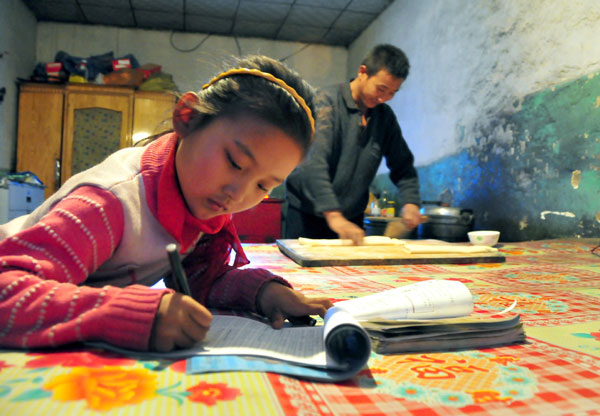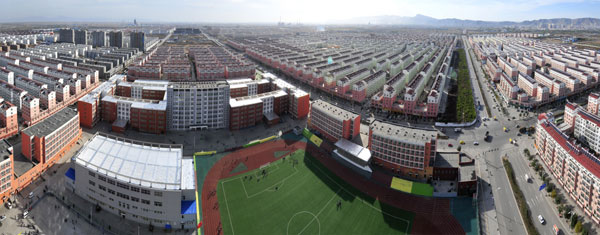Moving to the right side of the tracks
By Tang Yue (China Daily)
Updated: 2012-11-12 07:40
Ren Xinming followed in his father's footsteps and headed down into the mine at the age of 18. Five years ago, he retired at age 40.
Ren Xinming shares one room with his wife and their 9-year-old daughter, while his father, mother, 80, and 38-year-old sister live in the other.
 |
|
Ren Jie, 9, daughter of Ren Xinming, doing her homework. Li Yi/ For China Daily |
He receives 2,800 yuan ($448) every month from Datong Coal Mine Group, his former employer, and his wife earn another 1,000 yuan doing odd jobs. The financial pressure is overwhelming, especially as the couple pays about 20,000 yuan per annum in tuition and living expenses for their older daughter, 17, who is studying at a senior high school in another town.
"The market price of a new apartment would be at least 150,000 yuan and there's no way we could afford that," said Ren.
All mod cons
However, soon a new apartment with all mod cons will no longer be a daydream for the Ren family.
A housing project subsidized by the government and Datong Coal Mine Group has helped more than 60,000 mining households, including Ren's neighbors across the railway, to move to the newly built Hengan residential community, 5 km east of the shantytown. The new buildings sell for 480 yuan per square meter.
The Rens, together with around 30,000 other households, are expected to move into a new home in the residential community by the end of next year, according to Gao Yuwu, executive director of the Pengcheng property management company, part of Datong Coal Mine Group.
"Working as a miner is probably the most laborious job in the country and most of the men have also been living in terrible conditions for a long time." said Gao.
Improving the living conditions of low-income families, especially those of miners and foresters, has been a high priority on the agenda of China's central leadership during recent years and Vice-Premier Li Keqiang has paid numerous visits to shantytown families across the country, including a trip to Datong in 2009.
The central government invested 73 billion yuan in housing projects for slum residents from 2007 to 2011 and more than 10 million low-income households have moved to government-subsidized apartments measuring at least 45 square meters, according to a recent statement from the Ministry of Housing and Urban-Rural Development.
A further 12 million households will need to be re-housed in the coming years, the statement said.
Ease of life
Cao Yuzhong, a 64-year-old retired miner, paid 30,000 yuan for a 60-sq-m apartment and moved in 2009.
"To be honest, we never expected to live in such a clean and warm home. I thought the best I could do was to save money for a wedding room for my son," he said.
"When we lived near the mine, we had to transfer three times on the bus to get to downtown Datong. That meant we seldom went out, even on the weekend. Now we can take a bus directly and the journey only takes 30 minutes."
Cao's wife, Hao Xiuzhen, said both cooking and washing clothes have become easier since the move from the mining area. "The collar of my blouse would be filthy within a day, now it lasts at least three days," said Hao. "Also, it took at least 90 minutes to prepare dinner when I had to light the (coal burning) stove first."
The move was not only prompted by concerns about convenience and sanitary health, but also safety, said Bai Yuwen, who lived in a self-built bungalow in an area well known for mining subsidence for decades.
"On a few occasions, I woke up to find that a piece of land not far from my home had just caved in after many years of mining in that zone. Many of the miners had to sleep with that fear in the old days," said the 75-year-old, who moved to the Hengan community in 2007.
 |
|
A bird's eye view of the newly built Hengan residences for employees of Datong Coal Mine Group. Li Yi/ For China Daily |
Those living close to the mines were not the only ones exposed to danger. Life was also precarious for residents living closer to the city center: "There was no heating, so every family relied on gas stoves during the winter. Almost every year there was a case of carbon monoxide poisoning in the neighborhood because the stoves weren't used correctly or hadn't been properly maintained. Some people died," said Chen Huaiyu, who lived in a bungalow in the old city for 58 years.
Chen shared a bed with his two younger brothers and two younger sisters until he was 18. Their parents also lived in the same 23-sq-m room. When Chen married in 1978, the family built a 6-sq-m wedding room in the already overcrowded courtyard.
"Every family tried to seize any free space available to build a room, which was quite understandable because of their living conditions. However, it made the street pretty narrow and if there had been a fire, it would have resulted in a horrible disaster."
Old habits die hard
While the families were thrilled to move to their new homes, some old habits can't be changed overnight.
Bai Yuwen had problems adjusting to a sit-down toilet. He had never used one before he moved into his new apartment five years ago.
"I never thought about it until I moved. It really took me months to get used to it," he said, with a wry smile.
Gao from the property management company said that at first it was hard to collect payment for services, such as keeping the area clean and litter-free, security guards and other items. The people had never paid for security guards when they lived in the mining zone. And garbage was simply thrown out the windows and left on the street.
"Things are much better now. Some of these people have waited almost their entire lives to live in a new home. We just need to give them a little time to adjust to this new life," he said.
Contact the reporter at tangyue@chinadaily.com.cn
Yang Wanli contributed to this report.
Related Stories
Changes in growth model a priority 2012-11-09 08:31
Priority to rural areas in infrastructure development: Hu 2012-11-08 13:17
Tackling graft is 'priority' 2012-11-08 07:55
Intl community lauds China's development 2012-11-11 10:27
Hu's vision for development highlights the modern path 2012-11-09 08:04
Hu says China committed to peaceful development 2012-11-08 10:45

Top News
Xi emphasizes adherence to CPC Congress spirit
Top legislator urges implementation of congress spirit
Moderately prosperous China brings chances to world
Video







